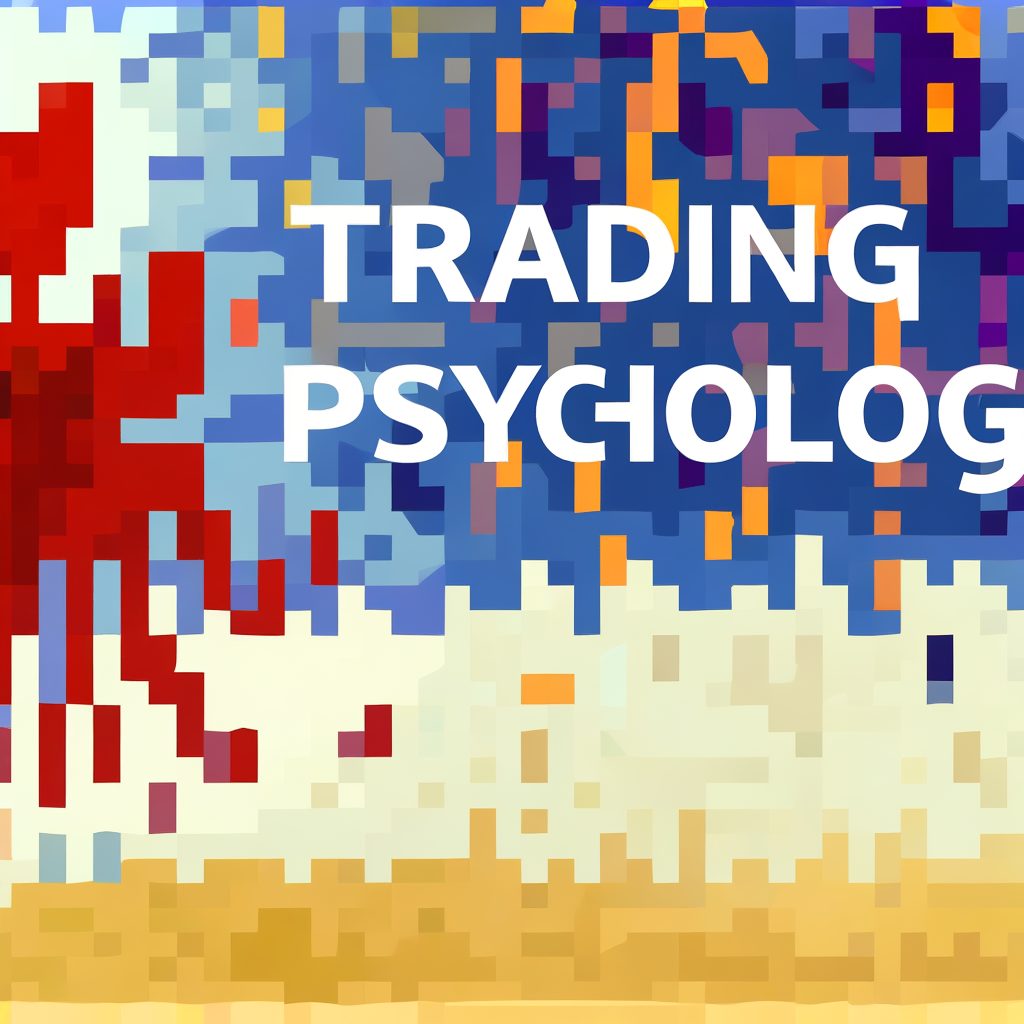
“Master Your Mind, Conquer the Market: Unleash the Power of Trading Psychology”
Mastering Your Emotions: Essential Trading Psychology Tips for Long-Term Success
Mastering Your Emotions: Essential Trading Psychology Tips for Long-Term Success
In the world of trading, success is not solely determined by one's knowledge of the markets or the sophistication of their strategies. An often-overlooked aspect that is just as crucial is trading psychology. The ability to maintain emotional equilibrium can make the difference between a thriving trading career and a series of costly mistakes. Understanding and mastering your emotions is, therefore, an essential component for long-term success in the volatile realm of trading.
One of the foundational tips in trading psychology is to develop a disciplined approach. Discipline ensures that you stick to your trading plan and resist the temptation to make impulsive decisions based on fleeting market movements or emotional reactions. It is the disciplined trader who can calmly navigate through market turbulence, adhering to a well-thought-out strategy rather than succumbing to the whims of fear or greed.
Moreover, it is imperative to cultivate patience. The markets will not always move in your favor, and opportunities for profitable trades are not constant. Patience allows you to wait for the right moment to enter or exit a trade, rather than making hasty decisions that are not backed by sound analysis. This virtue is particularly important in avoiding overtrading, a common pitfall where traders, driven by an urge to be constantly active, diminish their returns through excessive commission costs and poor decision-making.
Another key aspect of trading psychology is managing risk effectively. Every trade carries an inherent risk, and it is essential to accept this reality. By setting clear risk parameters and sticking to them, you can ensure that no single trade can significantly harm your overall portfolio. This approach not only protects your capital but also provides peace of mind, allowing you to trade with a clear head, free from the paralyzing effects of anxiety over potential losses.
Emotional detachment is also a valuable skill to hone. While it may seem counterintuitive, successful traders often treat trading as a business, devoid of emotional attachment to any particular position. This detachment enables them to cut losses when a trade goes against them, rather than holding on in the hope of a turnaround that may never materialize. Similarly, it prevents them from becoming overly confident or euphoric after a string of wins, which could lead to taking on excessive risk.
Furthermore, continuous learning and self-reflection are indispensable in the journey to mastering trading psychology. The markets are dynamic, and what worked yesterday may not work today. By committing to lifelong learning, you can adapt to changing market conditions and refine your strategies. Self-reflection, on the other hand, helps you to understand your emotional triggers and learn from your mistakes. Keeping a trading journal can be an effective tool in this process, providing a record of your emotional state and decision-making processes for review and improvement.
Lastly, it is crucial to maintain a balanced lifestyle. Trading can be stressful, and it is easy to become consumed by the markets. Ensuring that you have healthy outlets for stress, such as exercise, hobbies, or spending time with loved ones, can provide the emotional resilience needed to handle the pressures of trading.
In conclusion, while the technical aspects of trading are important, the psychological component is what truly enables traders to navigate the markets successfully over the long term. By developing discipline, patience, effective risk management, emotional detachment, a commitment to continuous learning, and a balanced lifestyle, traders can master their emotions and position themselves for enduring success.
The Trader's Mindset: Strategies to Enhance Your Trading Psychology
Title: Trading Psychology Tips
The Trader's Mindset: Strategies to Enhance Your Trading Psychology
In the world of trading, success is not solely determined by one's knowledge of the markets or the sophistication of their strategies. An often-overlooked aspect that is equally crucial is trading psychology. The mindset with which a trader approaches the markets can be the linchpin of their success or the crux of their downfall. Understanding and mastering the psychological elements of trading can lead to improved decision-making, greater discipline, and ultimately, better performance.
One of the foundational tips for enhancing trading psychology is the development of a clear and concise trading plan. A well-thought-out plan acts as a roadmap, guiding traders through the tumultuous markets. It should outline specific entry and exit points, risk management rules, and the criteria for choosing trades. Adherence to a trading plan instills discipline, as it requires traders to stick to predefined rules rather than succumbing to impulsive decisions driven by fear or greed.
Moreover, managing emotions is a critical aspect of trading psychology. The markets can evoke a rollercoaster of emotions, from the highs of winning trades to the lows of losses. It is essential for traders to remain level-headed, maintaining a sense of detachment from both profits and losses. Emotional regulation can be achieved through various techniques such as mindfulness, deep breathing exercises, or even stepping away from the trading desk to regain composure. By keeping emotions in check, traders can make more rational decisions that align with their long-term objectives.
Another strategy to enhance trading psychology is to embrace risk management. Understanding and accepting the inherent risks in trading can alleviate the stress associated with potential losses. Implementing stop-loss orders and only risking a small percentage of the trading capital on any single trade can help traders stay in the game for the long haul. This approach not only preserves capital but also provides peace of mind, allowing traders to focus on the execution of their strategy rather than the fear of losing money.
Furthermore, continuous learning and self-reflection are vital components of a robust trading psychology. The markets are dynamic, and as such, traders must be willing to adapt and learn from their experiences. Keeping a trading journal is an effective way to reflect on both successful and unsuccessful trades. This practice can reveal patterns in decision-making, highlight areas for improvement, and reinforce successful behaviors. Through this introspection, traders can cultivate a growth mindset, viewing losses not as failures but as opportunities to learn and refine their approach.
Lastly, setting realistic expectations is crucial for maintaining a healthy trading psychology. Unrealistic goals can lead to excessive risk-taking and disappointment. It is important for traders to set achievable targets based on their experience level, trading style, and market conditions. By setting realistic expectations, traders can avoid the disillusionment that often accompanies unattainable aspirations.
In conclusion, trading psychology is an indispensable facet of a trader's arsenal. By crafting a disciplined trading plan, managing emotions, embracing risk management, engaging in continuous learning, and setting realistic expectations, traders can fortify their psychological resilience. These strategies not only enhance decision-making and performance but also contribute to a more satisfying and sustainable trading career. As traders navigate the complex financial markets, a strong and well-tuned mindset can be their greatest asset.
Overcoming Fear and Greed: Key Trading Psychology Techniques for Better Decision Making

Overcoming Fear and Greed: Key Trading Psychology Techniques for Better Decision Making
In the world of trading, the battle is not only against market forces but also against one's own emotions. Fear and greed are the two most powerful emotions that traders grapple with on a daily basis. These emotions can cloud judgment, leading to impulsive decisions and potentially detrimental outcomes. However, by employing key trading psychology techniques, traders can learn to overcome these emotional hurdles and make better, more rational decisions.
Firstly, it is essential to understand that fear often manifests as a result of potential loss. Traders fear losing capital, missing out on a profitable opportunity, or making a wrong decision. This fear can paralyze a trader, causing them to hold onto losing positions in the hope of a turnaround or to exit winning positions too early to lock in gains. To combat this, traders must develop a well-thought-out trading plan. This plan should include clear entry and exit strategies, risk management techniques, and predetermined stop-loss orders. By adhering to a plan, traders can reduce the emotional impact of fear, as decisions are based on predefined criteria rather than momentary anxieties.
Conversely, greed can lead to equally destructive behaviors, such as overtrading or holding onto positions for too long in the pursuit of higher profits. Greed often stems from the desire to make quick and substantial gains, sometimes driven by the success stories of others. To counteract greed, traders should set realistic profit targets and adhere to them. It is also beneficial to take a step back and assess whether one's actions are driven by a sound strategy or merely by the allure of greater wealth. Keeping a trading journal can be an invaluable tool in this regard, as it allows traders to reflect on their decisions and understand the motivations behind them.
Another effective technique is to practice mindfulness and emotional awareness. By becoming more aware of their emotional state, traders can identify when fear or greed is influencing their decision-making process. Mindfulness exercises, such as meditation or deep-breathing techniques, can help traders maintain a calm and clear mind, enabling them to approach trading with a level-headed perspective.
Moreover, it is crucial for traders to recognize the role of discipline in trading psychology. Discipline involves sticking to the trading plan, even when emotions are running high. It requires patience to wait for the right trading opportunities and the fortitude to accept losses as part of the trading process. Traders should also avoid the temptation to constantly check the markets, as this can lead to overreaction to short-term market movements and increased emotional stress.
Finally, continuous education and learning can empower traders to make more informed decisions. Understanding market trends, technical analysis, and the economic factors that influence asset prices can provide a solid foundation for making rational trading choices. Knowledge reduces uncertainty, and with less uncertainty, there is less room for fear and greed to take hold.
In conclusion, overcoming fear and greed in trading is not about eliminating emotions but managing them effectively. By developing a robust trading plan, setting realistic goals, practicing mindfulness, maintaining discipline, and committing to ongoing education, traders can enhance their decision-making abilities. These techniques provide a framework for navigating the psychological challenges of trading, leading to more consistent performance and long-term success in the markets.
Building Resilience in Trading: Psychological Tips for Staying Strong in Volatile Markets
Building Resilience in Trading: Psychological Tips for Staying Strong in Volatile Markets
In the world of trading, the tumultuous ebb and flow of markets can test even the most seasoned investors. The psychological fortitude required to navigate these waters is often underestimated, yet it is as crucial as any technical strategy. To build resilience in the face of volatility, traders must cultivate a mindset that embraces discipline, emotional regulation, and continuous learning.
First and foremost, it is essential to acknowledge that trading is not just about numbers and charts; it's a psychological endeavor. The markets are a reflection of collective human behavior, and as such, they are prone to bouts of irrational exuberance and undue pessimism. Recognizing this can help traders understand that volatility is not an anomaly but a characteristic of the market. With this perspective, one can approach trading with a level-headedness that mitigates the impact of emotional reactions.
Discipline is the cornerstone of resilient trading. It involves setting clear rules for when to enter and exit trades and sticking to them even when instincts suggest otherwise. This approach helps in avoiding impulsive decisions that are often regretted in hindsight. Moreover, discipline extends to risk management. By determining in advance the amount of capital to risk on each trade and adhering to it, traders can ensure that no single loss is catastrophic.
Emotional regulation is another vital aspect of trading psychology. The highs of winning and the lows of losing can lead to overconfidence or fear, respectively. To stay resilient, traders must strive for emotional equilibrium. One effective method is to maintain a trading journal, documenting not just the trades but also the emotions and thoughts accompanying them. This practice can provide insights into emotional patterns and triggers, allowing traders to develop strategies to counteract them.
Furthermore, it is imperative to maintain a long-term perspective. Short-term losses can be disheartening, but they are part of the journey. By focusing on the bigger picture and the process rather than individual outcomes, traders can avoid the emotional rollercoaster associated with daily market fluctuations. This mindset fosters resilience as it aligns with the reality that not every trade will be successful, but a well-thought-out strategy can be profitable over time.
Continuous learning is also a key component of a resilient trading mindset. The markets are dynamic, and strategies that worked yesterday may not work tomorrow. By committing to ongoing education and adaptation, traders can stay ahead of the curve. This includes learning from both successes and failures. Each trade offers valuable lessons, and by analyzing what went right or wrong, traders can refine their strategies and improve their performance.
Lastly, it is crucial to take care of one's physical and mental health. Trading can be stressful, and without proper self-care, it can take a toll on one's ability to make sound decisions. Regular exercise, adequate sleep, and healthy eating can enhance cognitive function and emotional stability. Additionally, taking breaks from the markets can help prevent burnout and maintain a fresh perspective.
In conclusion, building resilience in trading is about more than just financial acumen; it's about cultivating a psychological toolkit that enables one to withstand the inevitable ups and downs of the market. By embracing discipline, emotional regulation, a long-term view, continuous learning, and self-care, traders can develop the mental toughness required to succeed in the volatile world of trading. With these psychological tips in hand, investors can approach the markets with confidence, ready to face whatever challenges come their way.
The Psychology of Risk Management: How to Cultivate a Disciplined Trading Approach
The Psychology of Risk Management: How to Cultivate a Disciplined Trading Approach
In the world of trading, the importance of a disciplined approach cannot be overstated. The psychological aspect of trading is often the linchpin of success or failure, and mastering it is as crucial as understanding market trends and indicators. Risk management is a fundamental component of this discipline, and it requires traders to cultivate a mindset that balances ambition with prudence.
To begin with, successful traders recognize the significance of emotional equilibrium. The markets are inherently volatile, and allowing emotions to dictate decisions can lead to impulsive and often regrettable actions. Instead, a trader must foster a sense of detachment from the immediate highs and lows, focusing on long-term goals and strategies. This emotional steadiness helps in making calculated decisions that align with one's trading plan, rather than reacting to market noise.
Moreover, the concept of risk tolerance is central to developing a disciplined trading approach. Every trader has a different level of comfort with risk, and it is imperative to understand and respect one's own boundaries. Overextending oneself can lead to undue stress and potential financial loss, while being overly cautious may result in missed opportunities. Therefore, it is essential to assess one's risk tolerance accurately and to adjust trading strategies accordingly.
Another key aspect of trading psychology is the ability to maintain discipline in the face of losses. Losses are an inevitable part of trading, and how one responds to them can make a significant difference. A disciplined trader will review their strategy, identify any missteps, and learn from the experience without allowing it to undermine their confidence or alter their risk management principles. This resilience is what enables traders to persevere and potentially recover from setbacks.
Furthermore, the practice of setting realistic goals is a cornerstone of a disciplined trading mindset. Ambitious targets can be motivating, but they should also be achievable and grounded in reality. Setting incremental goals that are in line with one's strategy and risk tolerance can provide a sense of progress and accomplishment, reinforcing disciplined behavior.
In addition, the use of stop-loss orders is a practical tool for enforcing discipline. By predetermining the level of loss one is willing to accept on a trade, a trader can limit their exposure and prevent emotional decision-making in the heat of the moment. This automated form of risk management ensures that a single trade does not disproportionately affect one's trading account or overall strategy.
Lastly, continuous education and self-reflection are vital components of a disciplined trading approach. The markets are dynamic, and a trader must be willing to adapt and refine their strategies as conditions change. Keeping abreast of market developments, learning from both successes and failures, and staying committed to an ongoing process of improvement will help in maintaining a disciplined approach to trading.
In conclusion, cultivating a disciplined trading approach is a multifaceted endeavor that hinges on psychological resilience. By managing emotions, understanding risk tolerance, learning from losses, setting realistic goals, utilizing stop-loss orders, and committing to continuous learning, traders can develop the mental fortitude required to navigate the complexities of the financial markets. A disciplined mindset is not only a defense mechanism against the unpredictability of trading but also a proactive strategy for sustainable success.


